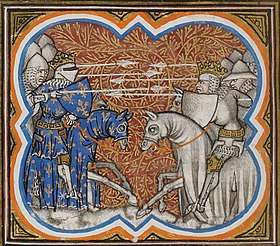Battle of Brémule
The Battle of Brémule was fought on 20 August 1119 between Henry I of England and Louis VI the Fat of France. Henry I had to defend his holdings in Normandy several times and defeated a French invasion at the Battle of Brémule in 1119.
| Battle of Brémule | |||||||
|---|---|---|---|---|---|---|---|
 | |||||||
| |||||||
| Belligerents | |||||||
|
Rebellious Norman barons/ Kingdom of France |
Duchy of Normandy/ Kingdom of England | ||||||
| Commanders and leaders | |||||||
|
Louis VI William Clito |
Henry I William Adelin | ||||||
| Strength | |||||||
| 400 knights | 500 knights | ||||||
| Casualties and losses | |||||||
| 140 knights captured | Insignificant | ||||||
The defeat at Brémule effectively crippled the baron's rebellion and led to King Louis having to accept William Adelin as Duke of Normandy. William was officially invested with the duchy in 1120, even though King Louis continued to support William Clito's claim to the honour.
This battle is the result of a fortuitous encounter between the two neighbours who were engaged in a lawkeeping operation on their respective borders, the limits of their kingdoms being still imprecise in the Vexin and in the valley of the Seine.
Chronicles from the French side describe the battle as a fierce and bloody one where Louis the Fat, despite his heavy weight, fought so close to the opposing knights that a Norman could pull the ties of his horse and shout: "The King is taken!", to which the King replied with a heavy blunt of his mace, shouting back: "The King is not taken, neither at war, nor at chess!" However, this was later proven to be a misattribution.[1]
On the other side, chronicles from the Norman side tell that their knights gained much profit from the ransoms paid by their many prisoners, and that they had only three casualties on their side.[2]
The battle was the last pitched battle that the Capetian monarchy would participate in for the next century. Despite a century full of warfare, the next true battle for the Capetians would be the decisive Battle of Bouvines in 1214 where Philip II Augustus defeated the Holy Roman Emperor Otto IV.[3]
References
- Rozan, Charles (1888), Petites ignorances historiques et littéraires, pp. 4–5.
- Orderic Vitalis, Historia Ecclesiastica VI 240–241. Cfr. Anglo-Saxon Chronicle 1119.
- Baldwin, John (1986). The Government of Philip Augustus: Foundations of French Royal Power in the Middle Ages. Berkeley and Los Angeles: University of California Press. p. 214. ISBN 0520052722.
External links
- Orderic Vitalis, "Battle of Brémule, according to Orderic Vitalis", from De Re Militari: The Society for Medieval Military History, online.